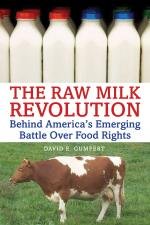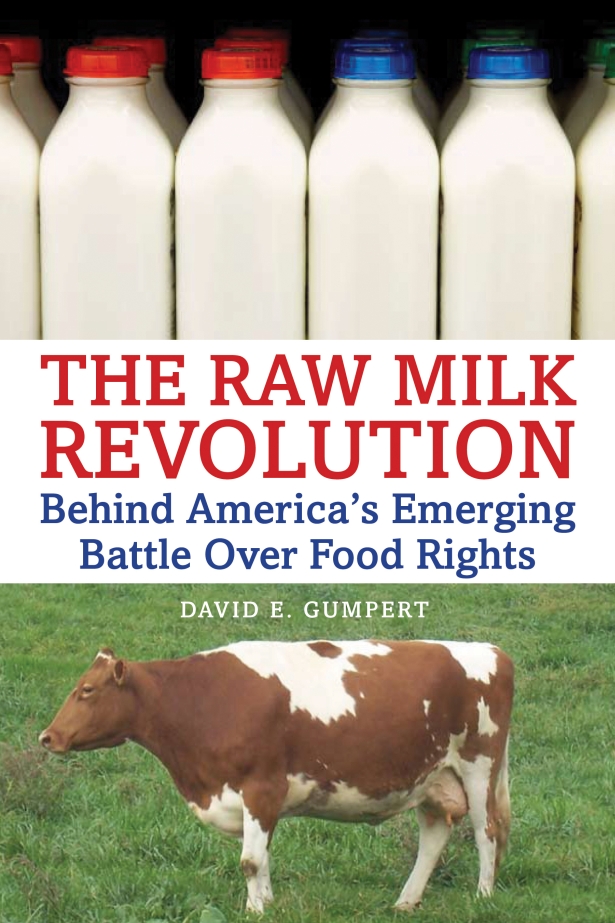From Joel Salatin’s foreword to The Raw Milk Revolution: Behind America’s Emerging Battle Over Food Rights by David Gumpert.
 I drink raw milk, sold illegally on the underground black market. I grew up on raw milk from our own Guernsey cows that our family hand-milked twice a day. We made yogurt, ice cream, butter, and cottage cheese. All through high school in the early 1970s, I sold our homemade yogurt, butter, buttermilk, and cottage cheese at the Curb Market on Saturday mornings. This was a precursor to today’s farmer’s markets.
I drink raw milk, sold illegally on the underground black market. I grew up on raw milk from our own Guernsey cows that our family hand-milked twice a day. We made yogurt, ice cream, butter, and cottage cheese. All through high school in the early 1970s, I sold our homemade yogurt, butter, buttermilk, and cottage cheese at the Curb Market on Saturday mornings. This was a precursor to today’s farmer’s markets.
In those days, the Virginia Department of Agriculture had a memorandum of agreement with the Curb Market that as long as vendors belonged to an Agricultural Extension organization such as Extension Homemaker’s Clubs or 4-H, producers could bring value-added products to market without inspection and visits from the food police. The government agents assumed that anyone participating in the extension programs would be getting the latest, greatest food science and therefore conform to the most modern procedural protocols, which created its own protection.
As the Virginia Slims commercial says, “We’ve come a long way, baby.” These conciliatory overtures to maintain healthy and vibrant local food economies exist no more. Today I can’t sell any of those things at a farmer’s market, and even if I take eggs some bureaucrat will come along with a pocket thermometer and, without warrant or warning, reach over and poke it through my display eggs to see if they are at the proper temperature. If they aren’t, no amount of pleading that those are for display only can dissuade the petulant public servant from demanding that I dump those display eggs in a trash can on the spot. I don’t sell at farmer’s markets anymore.
In 1975, when I graduated from high school and began plotting my farming career, I figured out that I could hand-milk ten cows, sell the milk to neighbors at regular retail prices, and be a full-time farmer. This was before most people had ever heard the word organic. But selling milk was illegal. In those days, we didn’t know about herd shares or Community Supported Agriculture or even limited liability corporations.
As a result, I went to work for a local newspaper and became the proverbial part-time farmer–working in town to support the farming passion. I don’t think I’ve ever gotten over the fact that the government arbitrarily determined to make it very difficult for me to become a farmer. That seems un-American, doesn’t it?
Isn’t it curious that at this juncture in our culture’s evolution, we collectively believe Twinkies, Lucky Charms, and Coca-Cola are safe foods, but compost-grown tomatoes and raw milk are not? With legislation moving through Congress demanding that all agricultural practices be “science-based,” I believe our food system is at Wounded Knee. I do not believe that is an overstatement.
Make no mistake, as the local, heritage, humane, ecological, sustainable — call it what you will (anything but organic since the government now owns that word) — food system takes flight, the industrial food system is fighting back. With a vengeance. By demonizing, criminalizing, and marginalizing the integrity food movement, the entrenched powers that be hope to derail this revolution.
This industrial food experiment, historically speaking, is completely abnormal. It’s not normal to eat things you can’t spell or pronounce. It’s not normal to eat things you can’t make in your kitchen. Indeed, if everything in today’s science-based supermarket that was unavailable before 1900 were removed, hardly anything would be left. And as more people realize that this grand experiment in ingesting material totally foreign to our three-trillion-member internal community of intestinal microflora and -fauna is really biologically aberrant behavior, they are opting out of industrial fare. Indeed, to call it a food revolution is accurate.
But revolutions are always met with prejudice and entrenched paradigms from the about-to-be-unseated lords of the status quo. The realignment of power, trust, money, and commerce that the local heritage-based food movement represents inherently gives birth to a backlash. By the time of Wounded Knee, Native Americans no longer jeopardized the American reality.
But to many Americans, these Natives had to be crushed, extinguished, put on reservations. Would America have been stronger if European leaders had listened to wisdom about herbal remedies and consensus building? The answer is yes. But to Americans, the red man was just a barbarian because he didn’t govern by parliamentary procedure or ride in horse-drawn stagecoaches along cobblestone streets. In fact, he was considered a threat to America. Just like giving slaves their freedom in 1850. Just like imbibing alcohol in 1925. Just like homeschooling in 1980.
The ultimate test of a tyrannical society or a free society is how it responds to its lunatic fringe. A strong, self-confident, free society tolerates and enjoys the fringe people who come up with zany notions. Indeed, most people later labeled geniuses were dubbed whacko by their contemporary mainstream society. So what does a culture do with weirdos who actually believe they have a right to choose what to feed their internal three-trillion-member community?
The only reason the right to food choice was not guaranteed in the Bill of Rights is because the Founders of America could not have envisioned a day when selling a glass of raw milk or homemade pickles to a neighbor would be outlawed. At the time, such a thought was as strange as levitation.
Indeed, what good is the freedom to own guns, worship, or assemble if we don’t have the freedom to eat the proper fuel to energize us to shoot, pray, and preach? Is not freedom to choose our food at least as fundamental a right as the freedom to worship?
How would we feel if we had to get a license from bureaucrats to start a church? After all, beliefs can be pretty damaging things. And charlatans certainly do exist. Better protect people from those charlatans — bad preachers and raw milk advocates.
But what does a society do when the charlatans are in charge? In charge of the regulating government agencies. In charge of the research institutions. In charge of the food system.
That is a real conundrum, because if health depends on opting out of what the charlatans think is safe, we are forced into civil disobedience. When the public no longer trusts its public servants, people begin taking charge of their own health and welfare. And that is exactly what is driving the local heritage food movement.
Lots of folks realize they don’t want industrialists fooling around with something as basic as food. People like me don’t trust Monsanto. We don’t trust the Food and Drug Administration. We don’t trust the Department of Agriculture. We don’t trust Tyson. And we don’t think it’s safe to be dependent on food that sits for a month in the belly of a Chinese merchant marine vessel.
This clash of choice versus prohibition brings us to today’s Wounded Knee of food. The local heritage-based food movement represents everything that is good and noble about farming and food culture. It is about decentralized farms. Pastoral livestock systems. Symbiotic multi-speciation. Companion planting. Earthworms. It is about community-appropriate techniques and scale. Aesthetically and aromatically sensual romantic farming. Re-embedding the butcher, baker, and candlestick maker in the village. And ultimately about health-giving food grown more productively on less land than industrial models.
Certainly some of this clash represents the difference between nurturing and dominating. The local heritage food movement — the raw milk movement — is all about respecting and honoring indigenous wisdom. The industrial mind-set worships techno-glitzy gadgetry and views heritage food advocates as simpletons and Luddites. Or dangerous criminals.
In this wonderful exposé The Raw Milk Revolution, David Gumpert employs the best journalistic investigative techniques to examine this clash from the raw milk battlefront. Be assured that the same mentality exists toward homemade pickles, home-cured meats, and cottage industry in general. The entrepreneurial spirit is alive and well in the food system, but it is harassed out of existence by capricious, malicious, and prejudiced government agents who really do believe they are doing society a favor by denying food choice to Americans.
The same curative properties espoused by raw milk advocates exist in a host of other food products, from homemade pound cake and potpies to pepperoni and pastured chicken. Real food is what developed our internal intestinal community. And it sure didn’t develop on food from Concentrated Animal Feeding Operations and genetically modified potatoes that are partly human and partly tomato. Long after human cleverness has run its course, compost piles will still grow the best tomatoes and grazing cows will still yield one of nature’s perfect foods: raw milk.
One of our former apprentices has just started a ten-cow herd-share arrangement with our customers. Here is a young, entrepreneurial, go-get-’em farmer embarking on his dream, serving people who are enjoying their dream of acquiring unadulterated milk. Can any arrangement, any relationship-between farmer and cow, cow and pasture, customer and producer be more honorable, respectable, open, and trusting? Everything about this is righteous, including respecting the individual enough to let her decide what to eat and what to feed her children.
Let the revolution continue.


